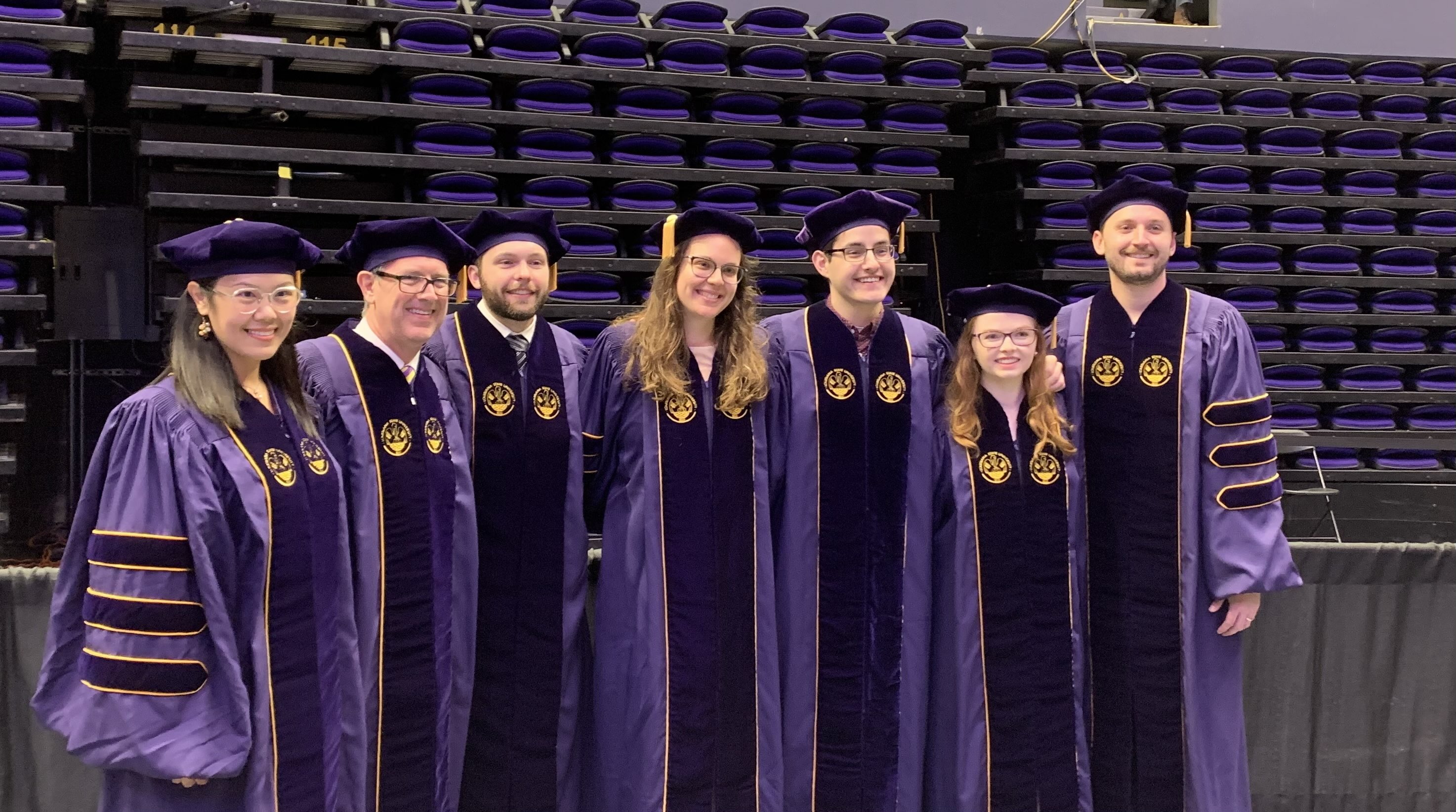PhD Program
All PhD students will complete coursework, general examinations, and a dissertation and defense. In addition, some fields require a foreign language.
Major Fields

Newly minted History PhDs. LSU graduation, May 2024.
From left to right: Dr. Zhenman Ye, Dr. Scott Madere, Dr. Ben Haines, Dr. Emily Muhich, Dr. Rob Powers, Dr. Alex Whitley, and Dr. K Howell Keiser.
The major fields offered by the department are:
- US History (inclusive)
- Europe to the Middle Ages
- Medieval and Early Modern Europe
- European History since 1500
- British History to 1650
- British History 1500 - present
** Please note that due to upcoming faculty retirements in British history, we are unable to accept PhD applicants in British History for the 2026-2027 academic year. MA applicants in modern British History are welcome to apply.
A major field committee requires at least three members of the graduate faculty, two of whom must be from the Department of History.
Degree requirements and pathway to degree for the PhD in US History
Degree requirements and pathway to degree for the PhD in British or European History
Minor Fields
Each student must complete one minor field that falls outside the scope of the major field. Students will choose a minor field in consultation with their major professor. Approval of the selection and scope of the field will be made by the student’s major professor and minor field professors. A minor field requires nine hours of coursework. Minor fields cannot fall within the same major field. Requirements for fulfilling the minor field will be determined by the student’s minor field professor.
For students concentrating in US history, the minor fields must fall outside the geographic parameters of the US.
Students may elect to take a minor field outside of the department, but only with the permission of their major professor. Requirements for an outside field are determined by the outside department.
In consultation with History Department faculty, students will choose and create a minor field. Examples of minor fields include: Women’s and Gender history; Political Theory; Intellectual History; Britain; Medieval Europe; Political Science; Archival Studies, Global History.
Coursework
A minimum of 54 semester hours of coursework and dissertation research are necessary to complete the program, but the plan of coursework depends on the student’s earlier preparation in history. Each student must choose two fields of study: one major field and one minor field.
General Examinations
All PhD students will complete general examinations. Once a student has completed all of their coursework (including major and minor fields, and foreign language when required), the student will take the general examination the following semester. General examinations are offered once each semester, in November and April. Once a student has completed all of their coursework (including major and minor fields), the student will take the general examination the following semester.
The major field exam will consist of two day long written exams and an oral examination with the student’s committee (which must include at least two members of the graduate faculty) and a representative from the Graduate School.
Minor field exams may consist of a written exam; in certain cases, a minor field may consist only of course work and a written exam will not be given.
Once the general examination has been successfully completed, the student becomes a PhD Candidate.
Dissertation and defense
All PhD students will research and write an original piece of scholarship based on primary source research. The dissertation must “embody creative scholarship” and “must add to the sum of existing knowledge and give evidence of considerable literary skill.” After completing the dissertation, the candidate defends it in an oral examination. The examining committee consists of the student’s major professor, and at least two other graduate faculty from the Department of History or other departments in the University, and a representative from the Graduate School, in accordance with the guidelines outlined in the LSU Graduate School Bulletin.
Foreign Language Requirement
PhD students in British History must demonstrate reading proficiency in one foreign language. PhD students in European History must demonstrate reading proficiency in two foreign languages (for medieval history one of those languages should be Latin).
PhD students in U.S. history are not required to have proficiency in a foreign language. However, US PhD students are encouraged to pursue additional coursework in foreign languages or demonstrate proficiency in skills relevant to their individual research topics. Examples include but are not limited to Geographic Information Systems, Statistics, and Art History. A student’s dissertation director will determine when this requirement has been met.